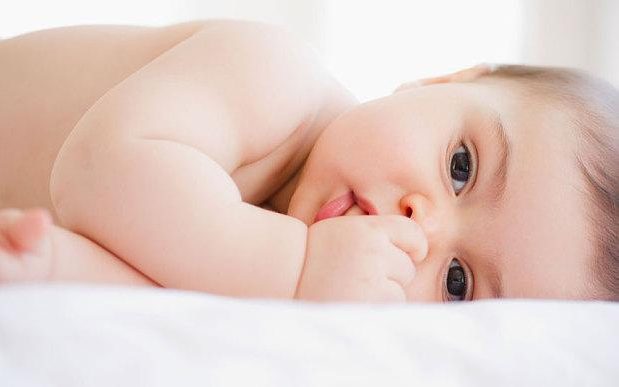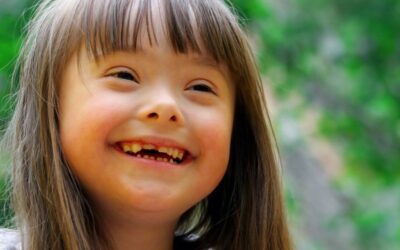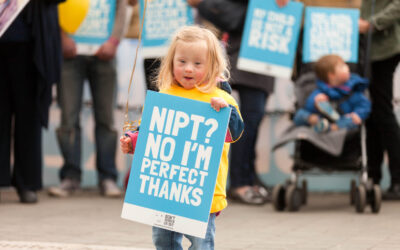Press release for immediate release
1,428 abortions for disability, as landmark case against UK Govt goes to European Court of Human Rights
The Department of Health and Social Care has this morning released abortion statistics for the first six months of 2022 (1 January 2022 to 30 June 2022) and these show that there were 1,428 abortions where a baby had a disability.
The figures also show that 120 of these abortions for disability took place when the baby was 24 weeks or over.
Due to a backlog in the HSA4 form processing, the Department of Health and Social Care have only released statistics for the first six months of 2022. While they have published the number of abortions for disability, they have not published the breakdown of abortion by specific disabilities, so abortions for Down’s syndrome have not been reported. These will be reported in January 2024.
LANDMARK CASE
The publishing of the abortion statistics follows the announcement from Heidi Crowter, a woman with Down’s syndrome, that she will be taking her landmark case against the current discriminatory abortion law, which allows abortion up to birth for Down’s syndrome, to the European Court of Human Rights.
The European Court of Human Rights could find the UK’s current disability abortion law to be in violation of human rights, which could not only have implications for the United Kingdom but also set a legal precedent for all forty-six countries that are members of the Council of Europe. The countries have a total combined population of over 700 million people.
Heidi Crowter, a 27-year-old woman from Coventry who has Down’s syndrome, is challenging the UK Government over a disability clause in the current law. She is a self-advocate who has publicly campaigned for the last six years for equal treatment for those with Down’s syndrome in all areas of life. Her case has been heard in the High Court and Court of Appeal and she will now take it on to the European Court of Human Rights.
Heidi has been joined in her fight for justice by Máire Lea-Wilson from Brentford, West London, whose four-year-old son Aidan has Down’s syndrome. Máire Lea-Wilson was placed under pressure to have an abortion when a 34-week scan revealed her son had Down’s syndrome. There has been widespread coverage of Heidi and Máire’s case across major media outlets.
BACKGROUND
Currently in England, Wales and Scotland, there is a general 24-week time limit for abortion, but if the baby has a disability, including Down’s syndrome, cleft lip and club foot, abortion is legal right up to birth.
There were 3,370 disability-selective abortions in 2021, a 9% increase from 3,083 in 2020. The number of late-term abortions at 24 weeks gestation or over where the baby has a disability increased by 20% from 229 to 274.
The statistics showed there were 859 abortions where a baby had Down’s syndrome in 2021, an increase of 24% from 2020. The statistics also show a 71% increase in late-term abortions at 24 weeks gestation or over where the baby had Down’s syndrome, increasing from 14 in 2020 to 24 in 2021.
The UN Committee on the Rights of Persons with Disabilities has consistently criticised countries that provide for abortion on the basis of disability.
The Committee on the Rights of Persons with Disabilities’ concluding observations on the initial report of the United Kingdom of Great Britain and Northern Ireland made a key recommendation that the UK change its abortion law so that it does not single out babies with disabilities. The Government has decided to ignore this recommendation.
The Disability Rights Commission (now the Equality and Human Rights Commission) has said that this aspect of the Abortion Act “is offensive to many people; it reinforces negative stereotypes of disability…[and] is incompatible with valuing disability and non-disability equally”.
The 2013 Parliamentary Inquiry into Abortion for Disability found the vast majority of those who gave evidence believed allowing abortion up to birth on the grounds of disability is discriminatory, contrary to the spirit of the Equality Act 2010 and that it affects wider public attitudes towards discrimination. The Inquiry recommended Parliament review the question of allowing abortion on the grounds of disability and should consider repealing section 1(1)(d) of the Abortion Act which allows for it.
Disabled peer Lord Shinkwin proposed a Bill in the House of Lords that would have repealed section 1(1)(d) of the Abortion Act – the Bill was undefeated but unfortunately ran out of time. The Bill was supported by Disability Rights UK.
Polling has shown that the majority of people in England, Wales and Scotland feel that disability should not be grounds for abortion at all, with only one in three people thinking it is acceptable to ban abortion for gender or race but allow it for disability.
Heidi and her legal team have set up a CrowdJustice crowdfunding page to help raise funds for legal proceedings, pay for legal advice and prepare for the case. To find out more and to make a contribution to the case visit:www.crowdjustice.com/case/downrightdiscrimination/
Lynn Murray, spokesperson for Don’t Screen Us Out and mother of Rachel who has Down’s syndrome, said:
“As a mother of a 23-year-old daughter who has Down’s syndrome, I see every day the unique value she brings to our family and the positive impact she has on others around her.
It is deeply upsetting to see another 1,428 babies with disabilities screened out by termination in the first six months of 2022.
It is also concerning that despite the leaps that advocacy groups have made in raising awareness in support of people with Down’s syndrome and other conditions, abortion for disability is still so commonplace and widespread in the UK. In fact, we hear from parents all the time about how abortion was repeatedly presented to them in the hospital as an obvious solution following the news that their baby had Down’s syndrome.
In England and Wales, around 90% of babies found to have Down’s syndrome are aborted. This raises questions for the Government about the purpose of prenatal screening and a law which encourages this situation to occur.”
Comment from Lynn Murray and Heidi Crowter relating to Heidi taking her case to the European Court of Human Rights is available in the press release here: https://dontscreenusout.org/press-release-84-increase-in-abortions-where-baby-had-downs-syndrome-in-scotland-disability-group-call-on-scottish-government-to-undertake-urgent-inquiry/
ENDS
- For more information on the Don’t Screen Us Out campaign, see our website www.dontscreenusout.org or email info@dontscreenusout.org
- For interviews, contact Don’t Screen Us Out spokesperson Lynn Murray on 0784 0966 736 or email info@dontscreenusout.org
- Abortion statistics: https://www.gov.uk/government/statistics/announcements/abortion-statistics-for-england-and-wales-january-to-june-2022
- Photos and videos of Heidi and other people with Down’s syndrome holding rallies to support the case that are available to be freely used by media are here:
- Heidi’s Facebook page:
- Previous news coverage featuring Heidi Crowter:
- Recordings of media interviews on the BBC, ITV, Sky etc are available here: https://youtube.com/playlist?list=PLG6Sw7kMnaLXUop-qCQP72ZEMLZ6YghZY
- Telegraph – https://www.telegraph.co.uk/news/2020/10/18/woman-downs-syndrome-says-better-dead-eyes-law-ahead-legal-challenge/
- Sky News – https://www.youtube.com/watch?v=Qz0pU7TKqb0
- https://www.dailymail.co.uk/news/article-8351603/Woman-Downs-Syndrome-launches-legal-bid-end-abortion-discrimination.html
- BBC Victoria Derbyshire Show – https://www.youtube.com/watch?v=eeNuWj3xhbM
- Channel 5 News – https://www.youtube.com/watch?v=eeNuWj3xhbM
- https://www.theguardian.com/society/2018/dec/03/my-life-is-just-as-important-as-everybody-elses-meet-the-disability-leaders
- https://www.bbc.co.uk/news/av/45790521/the-23-year-old-busting-myths-about-down-s-syndrome
- ITV News – https://www.itv.com/news/central/2019-03-21/he-makes-me-the-happiest-girl-in-the-world-twenty-three-year-old-with-downs-on-her-love-life-and-work-wouldntchangeathing-downs-syndrome-world-downs-syndrome-day/
- Huffington Post – https://www.huffingtonpost.co.uk/entry/having-downs-syndrome-doesnt-make-me-less-of-a-person_uk
- Daily Mail – https://www.dailymail.co.uk/video/news/video-1318649/Heidi-Crowter-s-powerful-s-Syndrome-message-Jeremy-Hunt.html



